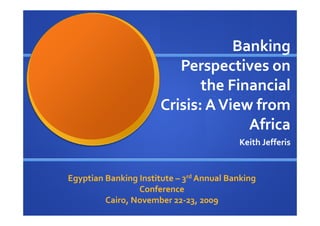
2009:Banking Perspectives on the Financial Crisis: A View from Africa
- 1. Banking Perspectives on the Financial Crisis: A View from Africa Keith Jefferis Egyptian Banking Institute – 3rd Annual Banking Conference Cairo, November 22-23, 2009
- 2. Impact of the Global Crisis on Banks in Africa Banks in Africa are affected, of course, but not in the same way as banks in developed countries Depends on level of financial development and integration with global financial markets Direct impacts: Bank balance sheets Vulnerable financial institutions & systems Indirect impacts: Arising from broader economic developments Changes in international supervisory standards
- 3. Direct impact of the crisis has been quite limited Financial institutions & systems Little evidence of institutional or systemic vulnerability Little need for central bank or government interventions (rescue packages, liquidity support, bank recapitalisation or nationalisation) Limited contagion from developed country problems Main exception: Nigeria – vulnerability to oil sector and stock market lending Why is this? Nature of balance sheets Supervision and capital Resilience resulting from macroeconomic & financial reforms
- 4. Balance sheets are low risk Lending Mostly deposit-funded Limited use of wholesale funding Low leverage Liquidity High Moderate loan-to-deposit ratios Risk Limited exposure to high risk/exotic assets Limited off balance-sheet operations International links Limited reliance on foreign funding Limited integration with int. capital markets In some cases, assisted by exchange controls
- 5. 40% 0% 10% 60% 90% 20% 30% 50% 70% 80% S Africa Swaziland Nigeria Kenya Burundi Ghana Source: IMF SSA REO Oct 2009 Zambia Niger Ethiopia Côte d'Ivoire Angola Mauritius Chad Tanzania Botswana Gabon Very liquid banks Liquid assets as % of total assets, 2007 Rwanda Moz'bique Liberia Congo, Rep. Congo, DR
- 6. Supervision & capital Quality of supervision has been improving in SSA FSAPs -> financial sector development programmes International standards: Basel core principles Investment in skills & infrastructure Banks are well capitalised Generally highly profitable CARs often above international minimum
- 7. 15 0 10 25 20 30 5 Mali C. d'Ivoire Rwanda C. Verde Cameroon Congo, DR S Africa Niger Burk. Faso Mauritius Source: IMF SSA REO Apr 2009 Burundi Senegal Guinea Lesotho M'gascar Moz'bique Eritrea Seychelles CAR Namibia Ghana Congo, Rep. Gabon Tanzania Average Malawi Kenya Botswana Zambia Regulatory Capital/Risk-weighted assets, 2007 Ethiopia Nigeria Robust Capital Adequacy Swaziland Angola Zimbabwe Liberia
- 8. Indirect Impacts – more important in longer term Global risk environment Trade flows & growth Remittances Exchange rates Credit slowdown Supervisory changes
- 9. Global risk environment Volatility in price/appetite for risk Volatility in short-term capital flows for EMs short- Higher equilibrium price for risk when dust settles Tightened risk assessment criteria in global banking groups Restricted access to capital (esp. credit lines to domestic banks from international banks) African debt & equity markets adversely affected by sell-offs by sell- international investors
- 10. South Africa EMBI+ spread
- 11. Total financial flows to Africa … volatile but recovering Annual flows Quarterly flows 35,000 3,500 30,000 3,000 25,000 2,500 20,000 2,000 15,000 1,500 10,000 1,000 5,000 500 0 0 2004 2005 2006 2007 2008 Q308 Q408 Q109 Q209
- 12. Slowdown in trade flows & economic growth Most African economies highly export-dependent export- Export sectors badly hit due to weak demand/prices (esp. commodities) Trade finance less accessible (more expensive, shorter tenors) Banking vulnerability from sectoral loan concentration Weakened household sector -> credit risk Rising arrears and deteriorating quality of collateral Larger current account deficits and constrained access to capital markets leads to exchange rate volatility, adding to uncertainty and balance sheet risks
- 13. Remittances Major contributor to FX earnings and household income in many African countries Vulnerable to economic slowdown in developed countries Reinforces balance of payments weakness and household balance sheet problems Banks handle most remittance payouts – source of fee income Latest estimates suggest modest decline in remittances to Africa – around 6% in 2009
- 14. Tighter credit conditions restrict business opportunities Reduced risk appetite and higher regulatory cost of risk Stricter lending criteria (collateral/deposit requirements) Flight to quality Limited appetite for new business Wider deposit-lending margins deposit- Reduced fee income (fx, remittances, arrangement fees) Need to be innovative in developing/pursuing business opportunities Slowdown in credit growth could exacerbate economic difficulties
- 15. Changing regulatory regime will have an impact Review of Basel II (-> Basel III?) (- Imposes many needs on African Increased regulatory capital vs banks & regulators: risk surveillance/early warning More complex regulatory HH and corporate balance regimes posing challenges for sheets, indebtedness, regulators vulnerabilities high frequency/timely data Countercyclical capital requirements contingency plans/bank resolution mechanisms Problems in deposit insurance? calibrating/identifying turning points supervisory co-operation co- Macroprudential supervision mapping of financial sector interlinkages Stress tests Banks – improved risk management & internal stress- stress- testing
- 16. Main risks facing African banking systems going forward Delayed impact of financial crisis via economic linkages & slow global recovery Export/trade problems -> banking problems -> wider economic impact Bank credit slowdown - > wider economic impact Weak surveillance, limited contingency plans, weak cross border supervision if conditions to deteriorate Weak risk management within banks Structural changes in global risk parameters making capital – raising more difficult More complex regulatory regimes making it more difficult to achieve international standards
- 17. Closing Remarks African banking systems came through global financial crisis largely unscathed, but longer term impacts may be adverse, with uncertain time lags and depth of impact Main concerns emanate from interaction of economic developments and financial conditions Banks will need to be vigilant with regard to risks and respond to new supervisory demands, while pursuing new lines of business Regulators need to improve surveillance, improve contingency planning and supervisory co-operation, while governments co- pursue longer term reforms